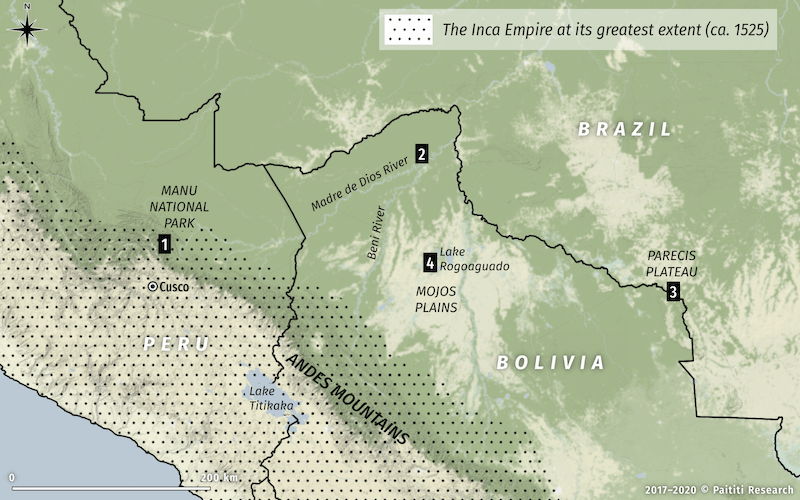The first recorded reference points to Paititi both as to a river and land. Combès (2011) says that the origin of this name lies in the pre-Colombian era, and it is connected to the migration of Guarani tribes in search of “Pai Sume“, the White King ruling the “land without evil“. As stated in Chronicle of Alcaya, an important Inca settlement Samaipata founded by Inca Guacane and his brother Condori — relatives of Huayna Capac — was successfully assaulted by 8000 Guaranis killing Guacane and taking his brother prisoner. This chronicle tells that 2000 Guaranis had detached from the major group assaulting Samaipata and headed north towards another goal — the Kingdom of Manco Inca, who was a nephew of Huayna Capac. This Kingdom called Mojos or Paititi was situated somewhere in the low-lying mountain range of Serra dos Parecis beyond Guapay and Manati (Itenez) rivers and rich in silver and precious stones. According to the chronicle, two satellite kingdoms, Samaipata and Mohos, existed quite independently governed from Cusco. Both kingdoms had been established shortly before Spanish arrival because, as chronicle tells, Manco Inca sent his son Guaynapoc to Cusco to notify the Inca about his discovery. However, Cusco had already been in the hands of Spaniards, forcing Guaynapoc to flee from Spaniards, followed by 20,000 people.
The fate of the Samaipata Kingdom is well documented, including archaeological means, but we know nothing that happened with the Mojos (Paititi) Kingdom of Manco Inca. We presume that lacking the capacity and support from the central power, they decided to retreat, being molested both by Guaranis and Spanish intruders who were invading their Kingdom from Cusco, Cochabamba, Pocona and even Asuncion in Paraguay and later on Santa Cruz de La Sierra in Bolivia. This hypothesis seems to be supported by the fact that no significant remnants of a long-term Inca presence have been discovered in a swampy area of the Mojos Planes (Llanos de Mojos) until now. Another fact that supports such presumption is expressed by Moore (2016, p. 230), who says that the leading analysts of Aymara or Quechua do not suggest an expansion of these languages in pre-colonial times towards the lowlands of the Apurímac, Urubamba, Alto Madre de Dios, Inambari, Tambopata, Beni or Mamoré river basins. He also states that there are no sufficient elements to affirm the Inca’s political-military dominance over the area.
Based on their deep-going researches, various authors located Paititi in entirely different locations. Pärssinen and Siiriäinen (2008) search Paititi in the region of the confluence of Madre de Dios and Beni rivers on the border between Bolivia and Brazil. Levillier (1976) points towards the Parecis Plateau (Serra dos Parecis) in Brazil. Finally, Tyuleneva (2012) associates Paititi with the Rogoaguado lake in Bolivia in the Mojos Planes. However, as already mentioned above, until now, there is no found archaeological discovery that would support the preassumptions of Incas more extended presence in those areas.

References
- Combès, Isabelle, and Vera Tyuleneva, eds. 2011. Paititi: Ensayos y Documentos [Paititi: Essays and Documents]. Cochabamba: Itinerarios. http://www.nhanduti.com/Nhanduti.EN/Libros.BO.EN/Itinerarios.EN/Paititi.EN/Paititi.EN.html
- Levillier, Roberto. 1976. El Paititi, El Dorado y Las Amazonas [El Paititi, El Dorado and the Amazons]. Buenos Aires: Emecé Editores
- Moore, Thomas. 2016. “Los Inka En Las Tierras Bajas de La Amazonía Suroccidental [The Inka in the Lowlands of the Southwestern Amazon].” Revista Andina, no. 54: 209-254
- Pärssinen, Martti, and Ari Siiriäinen. 2008. Andes Orientales y Amazonía Occidental: Ensayos Entre La Historia y La Arqueología de Bolivia, Brasil y Perú [Eastern Andes and Western Amazon: Essays between the History and Archeology of Bolivia, Brazil and Peru]. La Paz: Producciones CIMA
- Tyuleneva, Vera. 2012. “El Paititi y Las Expediciones Incas En La Selva Al Este Del Cusco [Paititi and the Inca Expeditions in the Jungle East of Cusco].” In Paititi: Ensayos y Documentos, edited by Isabelle Combès and Vera Tyuleneva, 7–22. Cochabamba: Instituto Latinoamericano de Misionología – Editorial Itinerarios. https://www.worldcat.org/title/paititi-ensayos-y-documentos/oclc/794264980
Ceslav Cieslar, 2020

